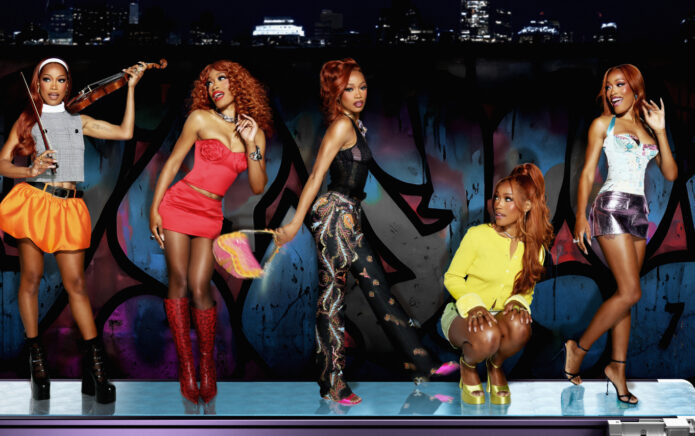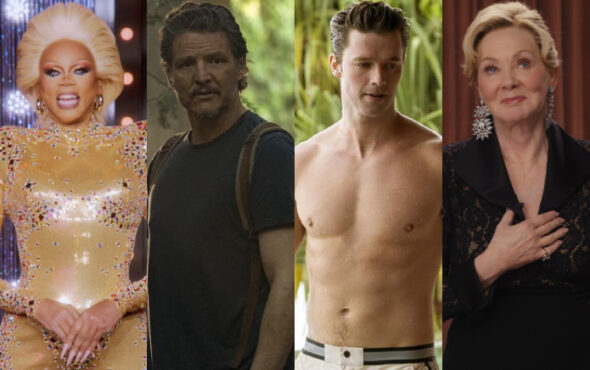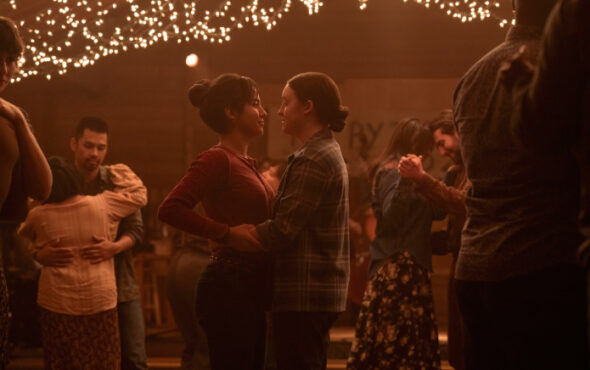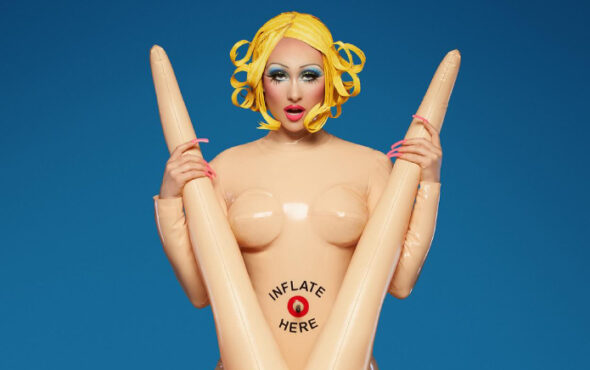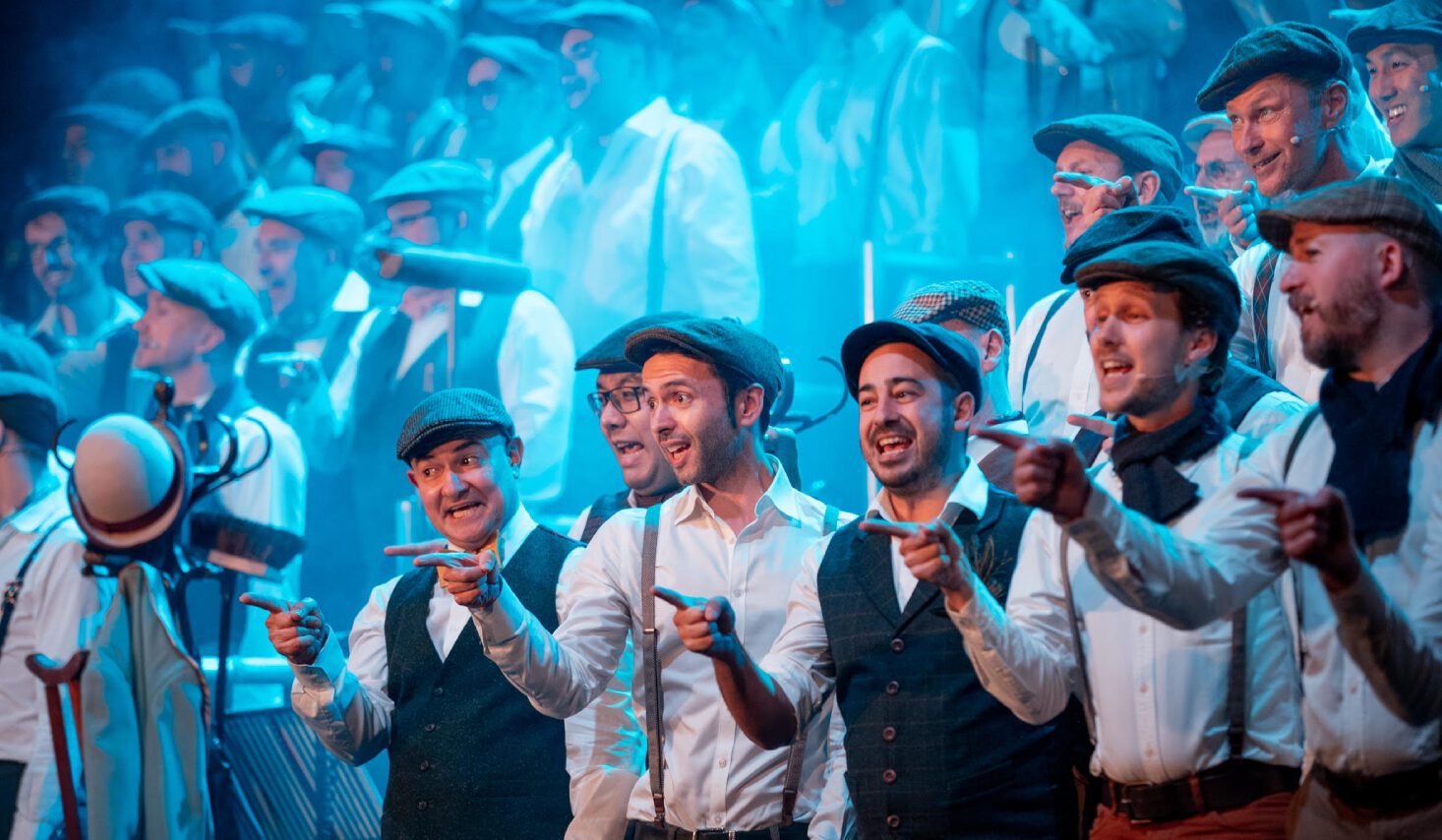
The London Gay Men’s Chorus – one of the UK’s best-known queer community groups – is rapidly approaching a significant milestone. Way back in December 1991, nine gay men gathered in Angel tube station to sing Christmas carols, raising funds for the Terrence Higgins Trust; the group has expanded significantly since then, and now hosts professional concerts. 30 years on, they will perform their Big Birthday Bash! show at the Clapham Grand to celebrate their special birthday. It’s largely a greatest hits set, with fan favourites drawn from countless shows they’ve performed over the last three decades.
And what a 30 years it’s been! The group has toured extensively, calling at major European cities including Paris, Amsterdam, Munich and Prague, alongside a North American tour, and has performed at some of London’s most prestigious venues including the Royal Albert Hall, the Palladium and the Royal Festival Hall. They’ve sung with Sir Elton John, Dolly Parton and the Pet Shop Boys, and sang at the wedding of Tom Daley and Dustin Lance-Black. They’ve performed on Top of the Pops, the Great British Bake Off, The One Show, Lorraine Kelly’s Christmas special and more besides. It’s quite a resume for a group with such humble beginnings.
As impressive as all this sounds – it’s not just about these headlines. The London Gay Men’s Chorus is first and foremost a community group: a charity that campaigns and has a mission to spread a message of equality and inclusivity, singing at countless protests, vigils and pride parades; and an organisation run by and for the benefit of its members. Ahead of the 30th birthday concerts, I caught up with some longstanding Chorus members to discover what the group has meant to them over the years, and find out more about what the group does both externally for the wider community and internally to support its own members.
Artistic director Simon Sharp joined the Chorus more than 20 years ago, originally as their accompanist. He told me about the initial invite to join from a former college friend. “They needed an accompanist, short notice, didn’t tell me any more details. I turned up and was a bit overwhelmed – at that time I guess there were 60 people, it felt like a lot! I was sat in the corner thinking ‘oh god, what is this’. And I played the rehearsal, and was asked if I could continue.” More than two decades later, he’s still there running rehearsals and planning the concerts.
“What makes me stay? It’s unique. I hate things being the same, so the fact that we can do a different creative programme time after time – we put on shows that are very different in feel from one season to the next. Therefore I think the variety, the creativity, and just the interesting make up of the group makes me stay. It’s a very dynamic group and I don’t know where else you would get that! Most choirs wouldn’t have the personality or the level of creativity that we have set up.”
Simon recalls the 2016 vigil on Old Compton Street in Soho, where the Chorus sang as part of the memorial to those who lost their lives in the Pulse nightclub shooting, as an important moment during his time with the group. “Bridge Over Troubled Water was a moment, you couldn’t have planned that. It was very sad of course but very timely. It was reacting, in solidarity, to a sad moment and showing support in the way that we can with music. It was just one of those very serendipitous moments where the music, the lyrics, the understanding, the performance, everything just glued together and it was a really cohesive moment.”
I also spoke to Simon about the Chorus’ schools outreach programme. “It’s important because it ‘normalises’ being gay – in a way it feels like things have moved on now but in many ways they haven’t, certainly at school age where kids are dealing with sexuality. I think it’s a fun and interactive way of providing a strong and positive role model, you’re not just going in there to lecture, to make a speech, in fact oftentimes we will just start with the music workshop. It’s using the power of music and the group to get that message that it’s ok to be gay. Which I think many people still struggle with, especially at school age.”
Peter Ptashko, the current Chair of the Chorus, joined in 2014, and has also been very involved with the Chorus’ outreach programme. “It’s through the power of music that suddenly the audience realises that they’re gay men and they’re singing – for some people that’s quite a big deal. Sometimes we go to schools and colleges that are abreast of it and it’s part of their anti-bullying week or part of their LGBTQ+ awareness day, but for some this is quite a shocking thing. For some in the room you can see this is quite a statement, just being here. Both are really powerful and really rewarding because they get so much out of it.”
A key memory for Peter is a performance from the Chorus’ 2015 Christmas concert at the Roundhouse in Camden. “In front of about 2,000 people, in the ensemble [an auditioned small group within the Chorus] – we did a number of complex pieces of choreography and it just felt like something I would never have had the chance to do, it felt like this was not me. This is not my life! And I have the opportunity to do it! It was such a packed audience, it’s such a big venue that you can’t really see the back of it, there’s just all these faces out there. The moment after I’d done that was, wow, did I, did we, just do that?”
Peter’s been part of the Chorus story for over seven years now but doesn’t see himself leaving any time soon. “I get something out of the Chorus that’s new every year, every season is different. We’re asking something different – there’s a different question, a different challenge. Obviously the current challenge is Covid-19. There’s something new every time and I feel like we as a Chorus are constantly reinventing ourselves. If it was the same every season I would probably take a step back and let somebody else take my place, as there’s a big waiting list. But as every season is different and we’ve changed so much, it constantly renews itself.”
He’s keen to highlight that part of what makes the Chorus’ story so special is the collective make up of its members past and present. “If I take a step back, the story of the Chorus is a thousand stories, or two thousand stories. It’s the power of those individual stories that really make the Chorus so compelling so that’s why I’m really passionate about it.”
A former Chair of the Chorus, John Carrion, has been part of the group for more than a decade. “I moved to London in September 2010 and joined Chorus in January 2011. So it’s been part of almost my entire London life!” He reflects on a memory from the time of the Equal Marriage debate in the UK Parliament. “I was able to go to the celebration of the passage of the bill at 10 Downing Street, I got to go in through the patriotic door, I got to meet David Cameron… whether that’s a highlight, we can talk about that another time! But the fact that I was shaking the hand of the Prime Minister, I thought that was a really neat moment for the movement, it’s really symbolic of the progress that the Chorus has helped to shape and has contributed to.”
John was instrumental in setting up the Chorus’ schools outreach programme, and shared a feel good full-circle moment of the time he was able to take the Chorus into his former school in Chicago during a USA tour in 2017. “That was a really special moment for me, just because that place, that auditorium, that stage, really has a special place in my heart – my brother went to the same school, my family have really been there forever. So it meant a lot to me to be able to bring this thing that I love, the Chorus, and be a positive influence not just to LGBTQ+ kids but also non-LGBTQ+ kids who will see this organisation.
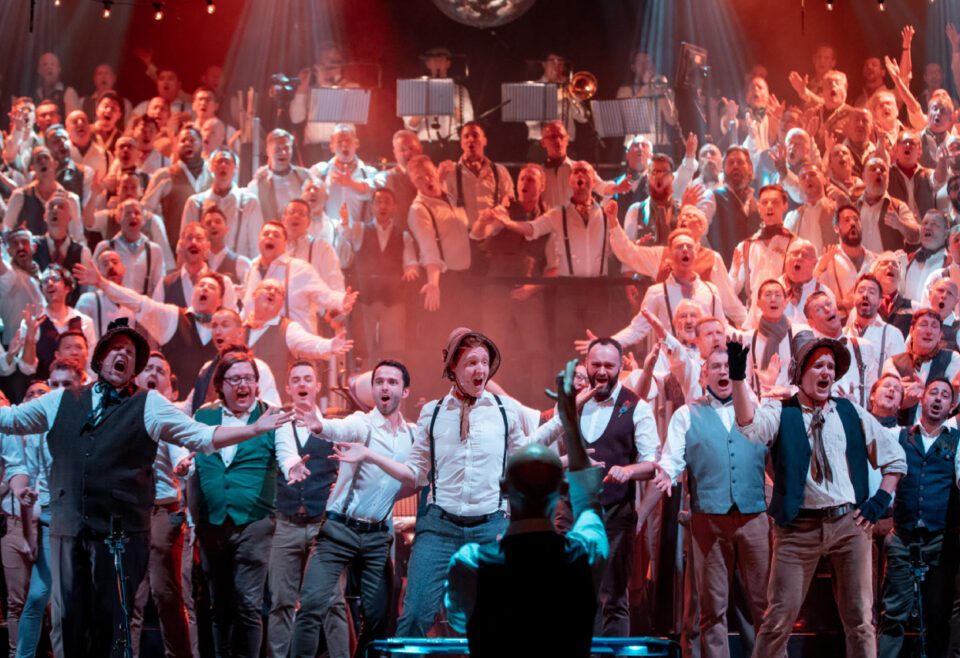
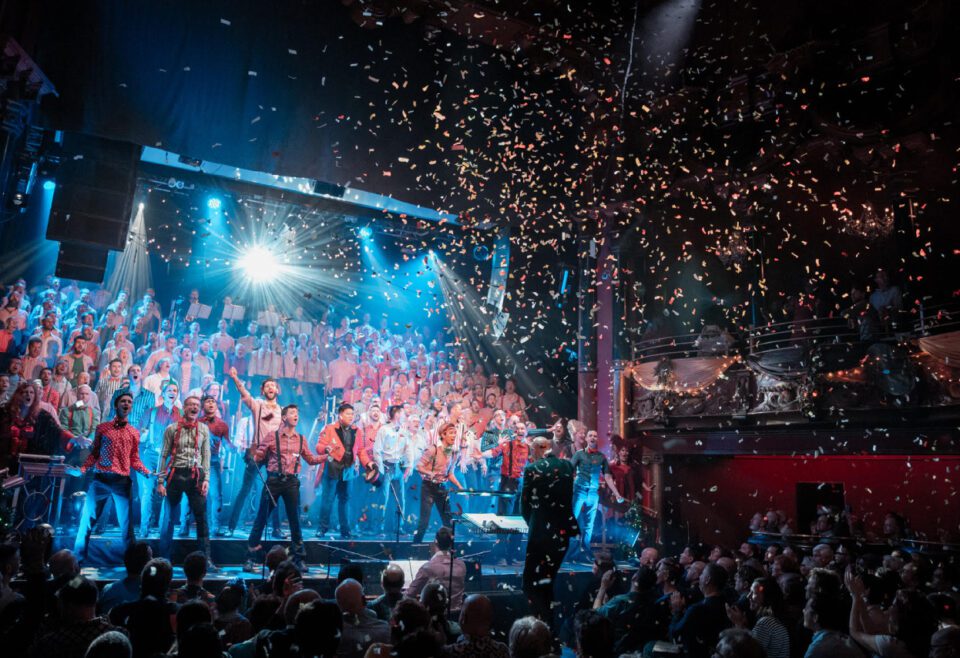
“They’re just able to infuse LGBTQ+ people into their daily lives and I think that’s really important. Hopefully if there were LGBTQ+ kids in that room that day, it will help them see that there’s a light at the end of the tunnel. I think it’s a really different world than the world I grew up in. I can’t even imagine them putting a gay chorus on when I was there! The fact that we were able to do it eventually, and that I got to be a part of it, on stage, was really really special.”
Mikey Geeleher, who joined the Chorus in 2013, told me what being part of this organisation means to him. “The community aspect is most important to me. When I moved to London – I think a lot of people can identify with this – it’s quite a difficult city to make friends in. With the Chorus, you join and you’re given access to 200 friends immediately who’ve got similar interests and a similar identity to you. It was the most gay men I’d seen in a social setting which wasn’t a bar or a club, which is something really special and it feels quite rare. Also we do amazing performances in incredible venues, which is great! But I think for me it’s the community aspect and what it’s helped me learn about myself and the wider community.
“Being a member of the Chorus has helped me broaden my horizons in terms of how old my friends can be. Prior to joining, I’d be hanging out almost exclusively with my age bracket, but now I’ve got friends who are my parents’ age or older. I don’t think that’s something which is very common, in the gay community especially – we’re quite segregated by age. We have this really lovely situation where you’ve got access to mentors who are older than you – and I can’t speak on behalf of them, but I think some of the older members have a reverse mentorship from the younger members of the Chorus. We’ve got a really nice cross section.”
A happy memory is the Chorus’ joint venture with Disney Theatrical Group for Pride 2017, which was a collaborative recording of ‘Circle of Life’ with the West End cast of the musical. “It was really fun but, more importantly, as a massive Disney fan I was hyper aware that I have never seen Disney do something like this prior to that. I know that if I’d seen that when I was younger, it would have been very powerful and impactful to see so many people like me connected with something that I love.” The video has now racked up an impressive 10 million views.
Echoing Simon, Mikey also recalls singing Bridge Over Troubled Water on Old Compton Street as an important moment. “I think every member of the LGBTQ+ community felt that attack – they were our brothers and our sisters that were killed. You come away from that feeling harrowed and powerless, so for us to be able to do what we do, which is sing, truly I think it’s one of the most important things I’ve ever done with my life: to be able to show up and do something and help other people process that was really very special.”
Navigating the pandemic has been a challenge for Chorus members, who have tried to stay connected via virtual rehearsals, as well as socials and quizzes. As one of the younger and more tech-savvy singers with the group, Mikey has been involved in organising interactive digital events to help members stay connected during the lockdowns, one of which was a panel discussion on HIV. “It’s a Sin was a cultural moment for the the LGBTQ+ community, especially for gay men who were inordinately affected by the AIDS crisis. As a gay man who came of age in the 2000s I feel very disconnected from that part of history. I talked about being friends with older members of the Chorus and the broader horizons of the people that are part of our community and I realised that this isn’t just a TV programme, this is lived experience that people who I sing with went through and I don’t know enough about it.
“After watching the series I wanted to organise a panel event with members of the Chorus – we were lucky to have incredible panelists, some of which are HIV+ share their experiences of that time. It was such an impactful programme, it would have definitely been something we’d have talked about if we’d have been in rehearsals. Hopefully it had a two-fold impact – one, for the younger members of the Chorus like me who didn’t live through it, a chance to ask and hear about those lived experiences; and hopefully for the people who did live through it, a channel to process the trauma that perhaps watching the show stirred up. I’m glad we were able to do it – it was a way for us to connect even though we were apart from each other during a difficult part of the pandemic.”
I asked Mikey what makes him stay after all these years. “As long as I’m in London I can’t imagine leaving – and because of the Chorus I can’t imagine leaving London. It’s just so special to me, it’s a big part of my identity, it gives me so much. I’m so happy to be able to give back to it when I can. It’s a second family – that’s why I stay, I’ve got my actual family who I love, up north, I’ve got my London family of the Chorus down here. I just can’t imagine what my life would be without it.”
It’s been a real privilege to be able to hear and share the testimony of these gay men, but the most genuine pleasure is this: I’ve been a part of this amazing organisation for over five years too, and can pay testament to just what an incredible community has been created. I know these people; these are my people. I’ve been clubbing with Simon in Prague, and together we’ve sampled many of Soho’s rather questionable house whites (like our wine preferences, we too are both cheap and white – I feel Simon would probably make this joke if I didn’t!).
Both Peter and I are keen runners, and have been jogging together around Hampstead Heath and Highbury Fields; I’ve been to John’s place for dinner and have returned the favour; I’ve lost count of the theatre trips and brunches that Mikey and I have shared. Getting to know these men, hearing their stories, being part of their journeys – it’s been an absolute joy. I’ve never walked into a room and felt more at home than when I joined my first rehearsal – here was a ready-made community of folk who were just like me. For someone who had recently moved to London and was looking to meet likeminded people, it was a lifeline.
I joined the Chorus in the summer of 2016 and wasn’t able to take part in the vigil on Old Compton Street as I hadn’t yet learned the songs, but I still attended and watched, and can remember just how powerful a moment it was – it felt important, as if the Chorus was raising a voice on behalf of the community at a time when we needed to be heard. I took part in the recording of ‘Circle of Life’ in 2017, and sang at the anniversary vigil outside the Admiral Duncan in 2019; I look forward to making many more memories with my London family. It’s an organisation that has completely shaped my journey in this city – I count the guys I’ve met through the Chorus among my best friends.
Those who’ve been part of this group – or who have seen our shows – will know just what an integral part of London’s queer fabric it now is. So let’s raise a toast to the London Gay Men’s Chorus – for the advocacy, the protest, the vigils, the outreach, and the truly unique and thriving community that it has become. Here’s to the next 30 years!
Big Birthday Bash! plays at the Clapham Grand on 2, 3 and 4 December 2021. More information can be found here.
